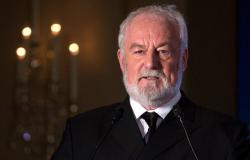
If the organization of an event has set up a whole question and answer page about your participation on their website, that is usually not good news. The European Broadcast Union (EBU), the organization behind the Eurovision Song Contest, apparently has many questions to answer about Israel’s participation. They even feel forced to explain why Israel – a country in Asia – is participating in a European song competition at all (in short: they have been doing so for a long time, that’s why).
Israel’s participation is therefore the most controversial in years, as a result of the war between Israel and Hamas and the many civilian deaths that occur in the Gaza Strip. In recent months, there have been petitions and demonstrations against Israel’s participation in the Swedish city of Malmö from May 7 to 11, but the EBU insists: we are non-political and we prefer to bring people together rather than exclude them.
That is not entirely correct: Russia has not participated since 2022, when, after the invasion of Ukraine, several countries called for Russia to be excluded from the edition in Turin. Russian participation would “discredit the competition,” the EBU thought at the time – an apparently political position. The AvroTros, responsible for the Dutch entry, also https://twitter.com/songfestival/status/1497171779395141632 on excluding Russia.
Israel is not Russia
Yet the situation around Israel is difficult to compare with that around Russia, EBU director Noel Curran argues on the question and answer page, because the relationship between the Israeli state and the executive broadcaster would be fundamentally different than was the case in Russia. The Russian broadcasters themselves were suspended in 2022 for not adhering to the rules. The Israeli broadcaster is not that close to their government at all, in fact they have almost been shut down by the government several times. Therefore, Curran says, Israeli participation is not inherently political, as Russia’s was.
And so singer Eden Golan (20) will soon participate on behalf of Israel with ‘Hurricane’ from May 7. Golan – who grew up in Russia and left there with her parents in 2022 because of anti-Semitism and the invasion of Ukraine – sings about Israeli suffering in the song, but not too clearly because then it becomes too political. A first version of the song was also rejected for that reason, it was then called ‘October Rain’ and the lyrics also referred to the Hamas attack on Israel on October 7, 2023. They first submitted another song, but that too was rejected. rejected because it was too political according to the EBU. ‘Hurricane’ is ‘October Rain’ with a different name and new lyrics. ‘I’m still wet from this October rain‘ became for example ‘I’m still broken from this hurricane‘. “I think the message is clear,” Golan told Israeli broadcaster Kan. “It is about a woman who is going through a personal crisis, a hurricane.”
It is reminiscent of the Ukrainian route. In 2016, they submitted the song ‘1944’, which was about Stalin’s oppression of Crimean Tatars on the peninsula that had just been re-annexed by Russia, but according to the EBU this was not explicitly included in the lyrics and it was allowed to continue. It also won. The Israeli song no longer contains explicit references to the conflict, but it does contain phrases such as ‘Baby, promise me you’ll hold me again‘ and ‘Don’t need big words, just prayers‘. According to the bookmakers, a top 10 place is currently possible.
Fortress
Political or not, Malmö is turning into a fortress. Bags are banned, there is more security and police for which all leave has been withdrawn, and the airspace is also closed to prevent an attack with drones. Reinforcements are even sent from Denmark and Norway. Whether this is all just because of Israel’s participation is unclear. But the city of Malmö does make that connection on its website, by explaining the tightened measures with the increased tensions surrounding the conflict between Israel and the Palestinians. Singer Golan herself, according to Israeli media, was advised for her safety to only leave her hotel room for the performance and not to be seen anywhere else. She is permanently protected.
In the meantime, the call for boycotts has not ceased. In several Scandinavian countries – including the host country – petitions and open letters addressed to the EBU were signed by thousands, including well-known artists such as Robyn, Aurora and Ane Brun. In Belgium, singer Thomas ‘Mustii’ Mustin, who will represent that country, said a boycott “won’t change anything. It would be a small symbol, but after a week it is forgotten.”
In the Netherlands, about 250 people from the creative sector, including Najib Amhali and Nasrdin Dchar, called on Joost Klein not to participate because of Israel. “I am only a poet of the fatherland,” he responded. “I am a small part of the machine. I don’t think that letter should have been addressed to me.” He would also be in debt if he dropped out now, he added with a laugh. According to Avrotros, the Eurovision Song Contest is not the place where “this deep-rooted conflict can be resolved.”
Correction (4/24/24): An earlier version of this article stated that Ukraine submitted ‘1944’ in 2017, which was in 2016. Russia also participated through multiple broadcasters, not just one. This has been supplemented above.
To share
Email the editor
Tags: Eurovision Song Contest political work Israels participation
-




